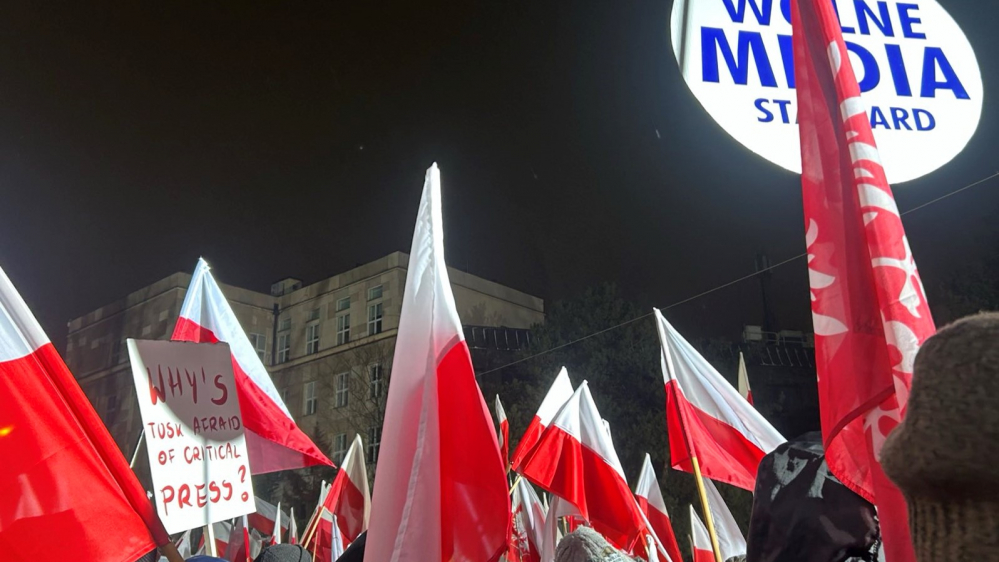Within a year of the left-liberal coalition led by Donald Tusk assuming power, Poland has witnessed an unprecedented assault on the rule of law – both in its scale and brutality. The new government selectively decides which judicial institutions to recognise and respects only court rulings that align with its political agenda. It has forcibly seized control of the prosecutor’s office and public media, circumvented constitutional legislative processes, and enacted new legal measures without proper oversight. This unfolding crisis is met with conspicuous silence from Ursula von der Leyen’s European Commission, which previously imposed severe sanctions on Poland for alleged rule-of-law violations under the former PiS-led government.
- A narrative of ‘restoration’ as a tool for power
Tusk’s government justifies its actions by framing them as part of a moral crusade to ‘restore the rule of law’ and settle scores with the previous administration. Statements from Donald Tusk and his ministers have drawn comparisons to denazification, the Nuremberg trials and postwar tribunals in Yugoslavia. Such rhetoric aims to demonise the former PiS government, equating it with authoritarian regimes, to delegitimise its legacy and cement the narrative that extraordinary measures are necessary.
Both Tusk and the minister of justice, Adam Bodnar, have suggested that breaking the law is acceptable if it serves the higher purpose of ‘restoring democracy’. This justification conveniently places Tusk above the law, allowing his administration to rewrite the rules to suit its agenda. The invocation of Nazi Germany is particularly provocative, using historical trauma to vilify PiS, Poland’s largest opposition party, and undermine political pluralism.
- A constitutional crisis in motion
Poland is now in the throes of a constitutional crisis. The executive and legislative branches have systematically undermined judicial independence, impartiality and the core principles of legality. Tusk’s government refuses to recognise key judicial bodies, including the Constitutional Tribunal, the National Council of the Judiciary and certain chambers of the Supreme Court. It has also disregarded numerous court rulings that conflict with its political objectives.
The government’s actions extend to demanding declarations of loyalty and self-criticism from judges who are seen as adversarial. Judges appointed under PiS are to be subjected to ‘independence tests’, and risk removal or demotion unless they align with the government’s expectations.
Where legal justifications are absent, Tusk’s administration fabricates them, often using parliamentary resolutions with no constitutional authority or commissioning supportive notarial opinions. T hese fig leaves of legality barely disguise the government’s disregard for the rule of law. Such tactics echo Soviet-era practices, summarised by the chilling maxim: ‘Give me the man, and I will find the crime.’
- The weaponisation of justice
Tusk’s government has turned the justice system into a tool for political vendettas, marked by show trials, political prisoners and reports of mistreatment. High-profile cases are prosecuted with charges that stretch or misapply legal provisions. The result is a justice system that resembles a theatre of political retribution rather than an impartial arbiter of law. Simultaneously, the police and intelligence services have been weaponised against political opponents. Operating as feudal militias, these institutions are deployed at the ruling coalition’s whim, sidelining their legal mandates. Officers are expected to obey superiors without question, undermining accountability and fostering an atmosphere of fear.
- The European Commission: silence as endorsement
The silence of the European Commission in the face of these develop ments is as telling as it is troubling. While the Commission previously wielded the rule of law as a cudgel against the PiS government, it has adopted a markedly different stance under Tusk. Far from condemning his administration’s actions, the Commission’s inaction suggests tacit approval.
This double standard is not surprising. For years, EU mechanisms ostensibly designed to uphold the rule of law have been repurposed as tools to pressure member states that diverge from the EU’s dominant left-liberal ideology. Poland, under the PiS government, faced sanctions and withholding of EU funds for alleged judicial reforms that pale in comparison to Tusk’s actions. Yet the Commission has remained silent, demonstrating its political alignment with Tusk’s coalition.
- An EU agenda at play
The European Commission’s complicity in Poland’s current crisis underscores its broader role as a political actor. Its aim has not been to ensure genuine adherence to the rule of law, but to advance a ‘progressive’ agenda and suppress dissenting political movements. Poland under PiS was a target for its conservatism, with the EU deploying Article 7 proceedings and financial penalties to undermine the government.
Now, under Tusk, Poland has become a staging ground for the EU’s experiments in political control. The Commission’s tacit support for Tusk’s methods sends a message to other member states: compliance with Brussels’ ideological preferences will be rewarded, while dissent will be punished, even at the cost of democratic principles.
- Implications for democracy and sovereignty
The unfolding situation in Poland has far-reaching implications. Domestically, Tusk’s administration has eroded the foundations of democracy by subverting judicial independence, politicising law enforcement and suppressing opposition voices. Internationally, the EU’s selective application of the rule of law undermines trust in its institutions and exacerbates divisions among member states.
If these trends continue, Poland risks sliding into a de facto one-party system, where dissent is criminalised and power is consolidated under the guise of ‘restoring democracy’. Meanwhile, the EU’s credibility as a neutral arbiter of law and governance is eroded, revealing its prioritisation of political conformity over democratic pluralism.
Poland’s constitutional crisis under Donald Tusk is not merely a domestic issue; it is a cautionary tale for Europe. By cloaking its actions in the language of democracy and the rule of law, Tusk’s government has embarked on a campaign of institutional subversion and political retribution.
